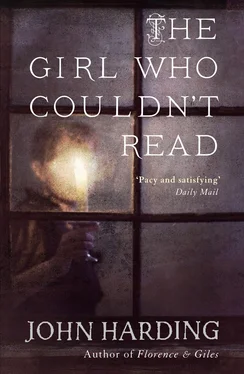JOHN HARDING
The Girl Who Couldn’t Read
The Borough Press
An imprint of HarperCollins Publishers Ltd
1 London Bridge Street
London, SE1 9GF
www.harpercollins.co.uk
First published in Great Britain by The Borough Press 2014
Copyright © John Harding 2014
Cover layout design © HarperCollins Publishers Ltd 2014
Cover photograph Susan Fox/Trevillion Images
John Harding asserts the moral right to be identified as the author of this work.
A catalogue copy of this book is available from the British Library.
This novel is entirely a work of fiction. The names, characters and incidents portrayed in it are the work of the author’s imagination. Any resemblance to actual persons, living or dead, events or localities is entirely coincidental.
All rights reserved under International and Pan-American Copyright Conventions. By payment of the required fees, you have been granted the non-exclusive, non-transferable right to access and read the text of this e-book on screen. No part of this text may be reproduced, transmitted, down-loaded, decompiled, reverse engineered, or stored in or introduced into any information storage and retrieval system, in any form or by any means, whether electronic or mechanical, now known or hereinafter invented, without the express written permission of HarperCollins.
Source ISBN: 9780007324255
Ebook Edition © August 2014 ISBN: 9780007562107
Version: 2015-03-18
New England, The 1890s
When a young doctor begins work at an isolated mental asylum, he is expected to fall in with the shocking regime for treating the patients. He is soon intrigued by one patient, a strange amnesiac girl who is fascinated by books but cannot read. He embarks upon a desperate experiment to save her but when his own dark past begins to catch up with him, he realises it is she who is his only hope of escape.
In this chilling literary thriller from a master storyteller, everyone has something to hide and no one is what they seem.
‘A tight gothic thriller … unbearably tense’
Financial Times
‘Genuinely exciting and shocking’
Independent
‘ The Girl Who Couldn’t Read will prove to be a delight for anyone with a love of Victorian fiction, the work of Sarah Waters or who takes pleasure in a bloody good story well told. Harding is a master storyteller and has produced another classic’
Me And My Big Mouth
‘Brilliantly creepy’
Daily Mirror
‘Hugely gripping … the most perfect ending in fiction, I swear’
Heartsong
‘A tour de force’
Daily Mail
‘Full of disturbing atmosphere, mysterious characters, and a page-turning plot. I flew through it’
A Literary Mind
‘Thoroughly ingenious and captivating … a scarily good story’
The Oxford Times
‘Nothing prepares you for the chillingly ruthless finale’
The Times
‘The tension is palpable. Leaves the reader gasping’
We Love This Book
‘A fantastic gothic horror story set in an asylum for women in 1890’s New England. It will grab you, excite you and leave you eager for more’
The Moustachioed Reader
‘Harding winds things nice and tight … brilliant tension … The eeriness pervades like a dank fog’
New Zealand Herald
For the book-lovers of Brazil
Contents
Cover
Title Page
Copyright
About the Book
Praise for John Harding
Dedication
Chapter 1
Chapter 2
Chapter 3
Chapter 4
Chapter 5
Chapter 6
Chapter 7
Chapter 8
Chapter 9
Chapter 10
Chapter 11
Chapter 12
Chapter 13
Chapter 14
Chapter 15
Chapter 16
Chapter 17
Chapter 18
Chapter 19
Chapter 20
Chapter 21
Chapter 22
Chapter 23
Chapter 24
Chapter 25
Chapter 26
Chapter 27
Chapter 28
Chapter 29
Chapter 30
Chapter 31
Chapter 32
Bibliography
Acknowledgements
Read an Extract for Florence and Giles
About the Author
Also by John Harding
About the Publisher
‘Dr Morgan expects you in his office in ten minutes. I will come and fetch you, sir.’
I thanked her, but she stood in the doorway, holding the door handle, regarding me as though expecting something more.
‘Ten minutes, mind, sir. Dr Morgan doesn’t like to be kept waiting. He’s a real stickler for time.’
‘Very well. I’ll be ready.’
She gave me a last suspicious look, top to toe, and I could not help wondering what it was she saw. Maybe the suit did not fit me so well as I had thought; I found myself curling my fingers over the cuffs of my jacket sleeves and tugging them down, conscious they might be too short, until I realised she was now staring at this and so I desisted.
‘Thank you,’ I said, injecting what I hoped was a note of finality into it. I had played the master often enough to know how it goes, but then again I had been a servant more than once too. She turned, but with her nose in the air, and not at all with the humility of a lackey who has been dismissed, and left, closing the door behind her with a peremptory click.
I gave the room a cursory glance. A bed, with a nightstand, a closet in which to hang clothes, a battered armchair that looked as if it had been in one fight too many, a well-worn writing desk and chair, and a chest of drawers on which stood a water jug and bowl, with a mirror hanging on the wall above it. All had seen better days. Still, it was luxury compared with what I had been used to lately. I went over to the single window, raised the blind fully and looked out. Pleasant lawned grounds beneath and a distant view of the river. I looked straight down. Two floors up and a sheer drop. No way out there, should a person need to leave in a hurry.
I shook off my jacket, glad to be relieved of it for a while, realising now I was free of it that it was a tad too tight and pulled under the arms, where my shirt was soaked with sweat. I sniffed and decided I really should change it before meeting Morgan. I took out and read again the letter with his offer of employment. Then I lifted the valise from the floor, where the maid had left it, onto the bed and tried the locks again, but they would not budge. I looked around for some implement, a pair of scissors or a penknife perhaps, although why I should expect to find either in a bedroom I couldn’t have said, especially not here of all places, where it would surely be policy not to leave such things lying about. Finding nothing, I decided it was no use; my shirt would have to do.
I went over to the chest of drawers, poured some water into the bowl and splashed it over my face. It was icy cold and I held my wrists in it to cool my blood. I looked at myself in the mirror and at once easily understood the serving woman’s attitude toward me. The man staring back at me had a wild, haunted expression, a certain air of desperation. I tried to arrange my hair over my forehead with my fingers and wished it were longer, for it didn’t answer to purpose.
There was a rapping on the door. ‘One moment,’ I called out. I looked at myself again, shook my head at the hopelessness of it all and heartily wished I had never come here. Of course I could always bolt, but even that would not be straightforward. An island, for Christ’s sake, what had I been thinking of? Sanctuary, I suppose, somewhere out of the way and safe, but also – I saw now – somewhere from which it would be difficult to make a quick exit.
Читать дальше












